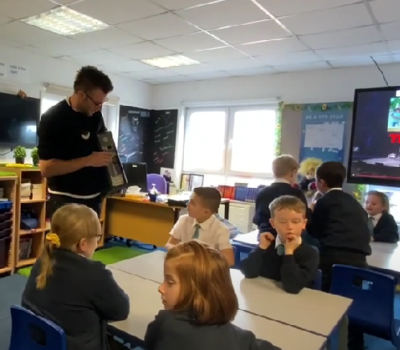

This one is from the heart, with a heavy heart.

Recently I have spent time in the (virtual) company of the one and only Andrew Cowley. In the world of education, Andrew is well known for his work on wellbeing. His books, The Wellbeing Toolkit and The Wellbeing Curriculum have been a staple part of my pedagogical diet for some time now. After the great man himself agreed to join me on my podcast #antismalltalk for a conversation on Teacher Hug Radio, I felt it was right to pick up the pen and write this blog.
I have always been someone who has always struggled with their workload and looked down the barrel of disillusioned. I used to leave work with a boot car full of books to mark over half-term. I’ve been burntout. I have grieved the loss of jobs and made every sacrifice for the profession I love. But, on one day in April as I drove into work it dawned upon me that sometimes in life the things we love, don’t always love us back. This wellbeing means more to me than most people.
The trenches
I can see the same issues that I faced during my teaching career surface amongst teachers and leaders today. I refer to this as being in the trenches. And don’t get me wrong, there is beauty in those trenches because teaching is the best job in the world. However, when we find ourselves struggling to cope with the insurmountable pressures of work, this trench widens. This is especially the case when personnel within organisations choose to hand us a shovel and force us to dig deeper, rather than throw down a ladder to help us see the light.
After conversations with Andrew and reflecting on the true purpose of wellbeing, my own definition of this fuzzy concept that has been born out of the Goveian stranglehold on our great profession is the following:
‘Teacher wellbeing is having the ability to say ‘I am really struggling; can I have some help?’ without fear of sanction or judgement.’
I will live by this because I believe it touches upon the nuances of support systems, structures and cultures within schools. Despite this, how many more blogs, podcasts, books or conversations do we need until, at a policy level, something is done to provide schools with the resources and funding to make wellbeing a fulfilling experience for all? Also, how can we find a praxis between theory and action? Talking about it is great but talk means nothing to that tired teacher who will return to their marking pile after yet another staff wellbeing yoga session.
Work-life balance
A consistent theme across conversations about teacher wellbeing is the idea of work-life balance. Without going into the semantics of this phrase, explicitly it implies that work and life hold equal weight and deserve equal standing. They don’t and neither should this ever be glorified. This veneer that we should have to find an equilibrium where we can survive at home and work, rather than thrive in both is problematic.
During various times of my teaching career, there was no balance. I was focused on work and home life was a peripheral part of my existence. But it was normalised that I would work almost unlimited overtime, and spend my evenings and weekends planning and marking. To miss family gatherings, birthdays, funerals and everything in between. By asking me to find a balance, there was not a level playing field. The scales were always tipped in the favour of work. After a number of personal and intimate relationships broke down, I was left at breaking point.
Although in such times the self-pity and guilt can begin. I regularly used to blame myself for not using a break time to mark an essay or lunchtime to catch up on emails. To anyone reading this blog, just have a quick glance at the Teacher Wellbeing Index created by the charity Education Support. The concerns about workload, anxiety and stress are ubiquitous. You are not alone. The scales are not and have not ever been tipped in the favour of life away from work.
There’s only so many of these our loved ones can take:
How many times does the pendulum swing towards work? Even those who have busy family lives are making sacrifices every day. It takes me back to a time when a colleague once told me the only people who can prosper in education are those who are single, with few responsibilities, or prepared, to some extent or another to shelve their family/social lives. Again, this is not to say that some people have and do get it right and are happy to commit but I will maintain that building a life supersedes what we do for a livelihood. This comes from someone who had a careerist tunnel vision but realigned their values after leaving it all in the classroom day-in and day-out.
I used to think that love and support at work could in some way compensate for a lack of love and support at home. I was most certainly wrong. If work overtakes life, then what’s left to balance? What is the true purpose of our existence? How much can goodwill be stretched? Also, what happens to us when the pendulum swings towards life, like, say, during the holidays?
Institutional pessimism
I gave six years of my life to teaching. I shared staff rooms with some of the most brilliant teachers and support staff. We all know of a colleague who is clearly disgruntled at their current situation and lets everyone within a foot of them know about it! As much as the term ‘mood hoover’ is unfitting, I prefer saying they are suffering from institutional pessimism. For me, this comes as a result of being ground down by the constant hustle and bustle, as well as the politics of the job. Just remember back to your first week as an NQT (now ECT). What happens to these enthusiastic and vibrant teachers that, in some cases, within 12 months are exiting the profession? Do they not feel valued? There is a fine line between optimism and pessimism and I would argue that when schools have an underlying ethos of wellbeing, where workload is effectively challenged and where arbitrary red-tap policies that are often framed as ‘for the kids’ are ditched. This is when wellbeing can become more than the proverbial Victoria Sponge in the staffroom on a Friday.
Taking back control in the trenches
The most difficult part of wellbeing is knowing what works for you and this comes through constant trial and error. With so much advice out there, it can become easy to get lost amidst all the unsolicited advice. But, from someone who the system chewed up, spat out, broke, and almost destroyed, I have just a few tips for you. I speak from a place of reflection after a period of grief.
The profession that I love is at breaking point. School staff are overworked, underpaid, overly-scrutinised and in a system that is governed by accountability. Something needs to change. At a policy level, we are yet to see real investment in staff and pupil wellbeing. Therefore, I wholly agree with Andrew Cowley that within the curriculum and the parameters of what we can control as educators, we must make wellbeing something that works for us, our loved ones, our pupils and our entire school community.
We need to carry on holding these conversations in spaces that were once unavailable to us. It’s never a bad time to ask people how they are doing. It is never a bad time to ask teachers and students how they are doing.
Finally, I would just like to finish with a quote from the daughter of the great Muhammad Ali. As I wiped away tears leaving a teaching post just a few years ago, nothing gave me more perspective than this. I hope it does the same for you too.
‘When I look at the world, I see many people build big beautiful houses, but live in broken homes. We spend more time learning to make a living than we do to make a life’ – Hana Yasmeen Ali.